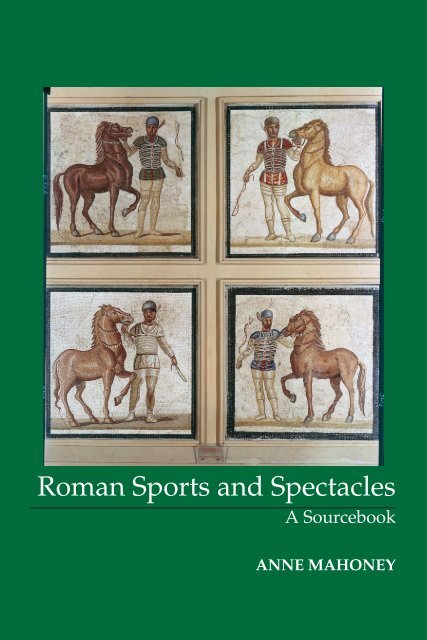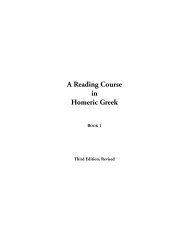Roman Sports and Spectacles - Focus Publishing
Roman Sports and Spectacles - Focus Publishing
Roman Sports and Spectacles - Focus Publishing
You also want an ePaper? Increase the reach of your titles
YUMPU automatically turns print PDFs into web optimized ePapers that Google loves.
<strong>Roman</strong> <strong>Sports</strong> <strong>and</strong> <strong>Spectacles</strong><br />
A Sourcebook<br />
Anne MAhoney
<strong>Focus</strong> <strong>Publishing</strong><br />
R. Pullins Company<br />
<strong>Roman</strong> <strong>Sports</strong> <strong>and</strong> <strong>Spectacles</strong><br />
A Sourcebook<br />
ANNE MAHONEY<br />
PERSEUS PROJECT<br />
TUFTS UNIVERSITY
Copyright © 2001 Anne Mahoney<br />
ISBN 0-58510-009-9<br />
This book is published by <strong>Focus</strong> <strong>Publishing</strong>, R. Pullins & Company,<br />
Inc., PO Box 369, Newburyport MA 01950. All rights are reserved.<br />
No part of this publication may be reproduced, stored in a retrieval<br />
system, or transmitted in any form or by any means, electronic,<br />
mechanical, by photocopying, recording, or by any other means,<br />
without the prior written permission of the publisher.<br />
10 9 8 7 6 5 4 3 2 1<br />
Cover: Charioteers with horses, <strong>Roman</strong> mosaic. Museo Nazionale<br />
<strong>Roman</strong>o, Rome, Italy. Scala/Art Resources, New York
Contents<br />
Introduction vii<br />
1. Origins <strong>and</strong> Foundations 1<br />
2. Gladiators 11<br />
3. Chariots <strong>and</strong> Circus Ludi 24<br />
4. Theater, Greek Athletics, <strong>and</strong> other events 37<br />
5. Women <strong>and</strong> <strong>Sports</strong> 65<br />
6. Politics <strong>and</strong> <strong>Sports</strong> 71<br />
7. Attitudes about Sport <strong>and</strong> <strong>Spectacles</strong> 91<br />
Glossary 101<br />
Chronology 109<br />
Maps 110<br />
Further reading 112<br />
Index of sources 114<br />
Subject index 117
Introduction<br />
· vii<br />
Every culture has its own forms of entertainment. In Rome the favorite<br />
entertainments were the great public games, called ludi, 1 <strong>and</strong> the similar<br />
spectacles originally put on for funerals of important people, called munera. 2<br />
These performances might include plays, combat sports, or chariot races. The<br />
types of entertainment the <strong>Roman</strong>s favored <strong>and</strong> the way they organized <strong>and</strong><br />
funded their spectacles can tell us a great deal about <strong>Roman</strong> life.<br />
This book sets out some of the most important textual sources for <strong>Roman</strong><br />
sports <strong>and</strong> spectacles, so that readers may explore for themselves how the<br />
<strong>Roman</strong>s entertained each other <strong>and</strong> what they thought of their spectacles.<br />
I have assumed no knowledge of <strong>Roman</strong> history or the Latin language.<br />
Key terms not only from sports but from <strong>Roman</strong> politics <strong>and</strong> culture are<br />
explained in a glossary <strong>and</strong> defined briefly in footnotes when they first<br />
appear; the most important have been left in Latin <strong>and</strong> appear in italics. In<br />
this introduction, I provide an overview of the subject <strong>and</strong> some historical<br />
background to help with the details of the selections.<br />
Why do we study ancient sports? <strong>Sports</strong> <strong>and</strong> spectacles are the main<br />
components of the popular culture of a society that ruled most of the<br />
known world for hundreds of years: the <strong>Roman</strong>s. Studying <strong>Roman</strong> sports<br />
<strong>and</strong>, especially, <strong>Roman</strong>s’ ideas about their sports gives us insight into how<br />
their society worked. Moreover, many of the issues that mattered to the<br />
<strong>Roman</strong>s are still important to us today:<br />
· Does watching violent entertainment harm or corrupt the spectator?<br />
· Are athletes good role models? Does participation in sports build<br />
character?<br />
· Is watching sports a good use of time for an educated or upperclass<br />
person? Or are sports <strong>and</strong> spectacles only for the lower<br />
classes?<br />
· Should public funds be used to build sports arenas <strong>and</strong> theaters,<br />
or to pay for competitions?<br />
· Who holds the record? Who won the most prize money? Who’s<br />
the best?<br />
1 Ludi (sg. ludus) are public spectacles, including games <strong>and</strong> theater performances. See the<br />
glossary for more information.<br />
2 A munus (pl. munera) is a duty or office; the word comes to mean a gladiator show.<br />
vii
viii · ROMAN SPORTS AND SPECTACLES<br />
As you will see in the sources collected here, the <strong>Roman</strong>s found their<br />
own solutions to these problems, <strong>and</strong> observing how they did so tells<br />
us something about what was important to them. Our sources include<br />
philosophical works, in which intellectuals theorize about the place of sport<br />
in society (Cicero, Seneca, Tertullian, Augustine); private letters between<br />
upper-class friends (Cicero, Pliny); <strong>and</strong> official government documents <strong>and</strong><br />
correspondence (Pliny, inscriptions). These all give us an idea of the views<br />
of the people who ran Rome <strong>and</strong> its empire. We are fortunate, though, that<br />
we can also see what ordinary <strong>Roman</strong>s cared about, from advertisements,<br />
graffiti, <strong>and</strong> tombstones written by <strong>and</strong> for them, <strong>and</strong> those make up the<br />
majority of the inscriptional sources in this book. <strong>Roman</strong>s of all walks of<br />
life went to the chariot races <strong>and</strong> gladiator fights, <strong>and</strong> most people appear<br />
to have enjoyed them.<br />
<strong>Roman</strong> sports are both similar to <strong>and</strong> different from the sporting events<br />
of the modern world. First of all, for the <strong>Roman</strong>s, sports, theater, <strong>and</strong><br />
other spectacles were all part of religious festivals. The closest analogy<br />
in contemporary American life might be the traditional Thanksgiving<br />
football game—but imagine football being played only on holidays, as an<br />
essential part of the observance of the day.<br />
Next, the <strong>Roman</strong>s were generally observers, not participants, <strong>and</strong> the<br />
competitors in Rome were usually slaves. This is particularly <strong>Roman</strong>, not<br />
an inevitable feature of a slave-holding society: in classical Greece, although<br />
it was also a slave society, citizens competed <strong>and</strong> exercised frequently, <strong>and</strong><br />
slaves were forbidden to compete in the great games. One possible reason<br />
for this difference between Greece <strong>and</strong> Rome might be that Greek citizens<br />
fought in the armies of their city-states, <strong>and</strong> physical fitness was thought<br />
to contribute to military preparedness. Rome, on the other h<strong>and</strong>, had a<br />
st<strong>and</strong>ing army of professional soldiers. Another contributing factor is that<br />
gladiator combat is more dangerous than any of the Greek combat sports.<br />
A gladiator fight was normally expected to end with the death of one<br />
of the combatants, while in a Greek wrestling or boxing match both the<br />
winner <strong>and</strong> the loser could expect to survive the fight. In the one sport that<br />
was common to both Greek <strong>and</strong> <strong>Roman</strong> competitions, chariot racing, both<br />
societies used hired or slave drivers: the owner of a chariot would not be the<br />
one holding the reins. Perhaps we can imagine the typical ancient <strong>Roman</strong><br />
being delighted with the idea of a sports TV network, <strong>and</strong> the typical ancient<br />
Greek being unimpressed.<br />
Finally, whereas many contemporary sports are team competitions,<br />
<strong>Roman</strong> sports generally involved individuals. Gladiators usually fought<br />
one on one. A typical chariot race involved four drivers, each competing<br />
for himself against the other three. Yet <strong>Roman</strong> chariot racing came as close<br />
as anything in the ancient world to the team sports we know today. Each<br />
chariot belonged to one of four “factions” or colors, called Blue, Green,<br />
Red, <strong>and</strong> White. Tombstones <strong>and</strong> other monuments for charioteers always
Chapter 5<br />
Women <strong>and</strong> <strong>Sports</strong><br />
· 65<br />
These texts focus on women, family life, <strong>and</strong> sexuality as connected with sports,<br />
especially with gladiators. Normally women did not compete, although they were<br />
occasionally brought into the arena for a novelty. They did go to the theater, the<br />
circus, <strong>and</strong> the arena, however, <strong>and</strong> it was a st<strong>and</strong>ard stereotype that they found<br />
gladiators attractive. See also Martial, Book of <strong>Spectacles</strong>, Statius, Silvae 1.6, all in ch.<br />
4, about women fighting in the arena, the selections from Ovid in chapter 3 about<br />
women watching the races at the circus, <strong>and</strong> the mention of women gladiators in<br />
the selection from Suetonius’s life of Domitian in ch. 6.<br />
Propertius, Elegies 3.14<br />
Here Propertius fantasizes about athletic women. Sparta was a city in Greece<br />
with a strong tradition of militarism; everyone in Sparta, male <strong>and</strong> female,<br />
was expected to keep in fighting shape. The customs described here are<br />
typical of the seventh—fourth centuries BC; by the first century BC, when<br />
Propertius lived, Sparta was under <strong>Roman</strong> rule like the rest of Greece <strong>and</strong><br />
was becoming <strong>Roman</strong>ized.<br />
Sparta, we are amazed at the rules of your wrestling schools, <strong>and</strong><br />
particularly at the young women athletes: for your girls, there is no shame<br />
in working out, naked among the men wrestling. The ball, thrown swiftly<br />
from h<strong>and</strong> to h<strong>and</strong>, confuses the spectators; the hoop rattles as the hooked<br />
stick rolls it along; a woman st<strong>and</strong>s in the dust at the far turning-post, or<br />
gets hurt in the harsh pancration. 92 Now she happily straps boxing-gloves<br />
to her h<strong>and</strong>s, now the heavy discus whirls as she throws it. Her horse’s<br />
hooves pound the ring; she girds a sword to her snow-white side <strong>and</strong><br />
covers her maidenly head with hollow bronze; <strong>and</strong> then she follows the<br />
local hounds over the ridges of Mt. Taygetus, getting snow in her hair. She<br />
is like the warrior Amazons, who bathe with nude breasts in the waters<br />
of Thermodon, or like Castor <strong>and</strong> Pollux on the s<strong>and</strong>s of Eurota, the<br />
one a victorious boxer, the other a horseman. Helen, they say, took up<br />
arms along with them, <strong>and</strong> did not blush to bare her breast before her<br />
divine brothers.<br />
92 The pancration was a Greek combat sport in which almost anything was permitted,<br />
except biting <strong>and</strong> eye-gouging.<br />
THEATER, GREEK ATHLETICS, AND OTHER EVENTS<br />
65
66 · ROMAN SPORTS AND SPECTACLES<br />
Thus the Spartan law forbids the separation of lovers, <strong>and</strong> allows a<br />
man to be at his mistress’s side in public places. Girls are not locked away,<br />
timid <strong>and</strong> under guard, <strong>and</strong> a man does not have to fear punishment.<br />
You can talk to her yourself <strong>and</strong> plead your case with no middle-men, no<br />
rejection, no long wait. Rich purple clothes do not seduce w<strong>and</strong>ering eyes,<br />
<strong>and</strong> there is no fussing with perfumed hair.<br />
The <strong>Roman</strong> woman, on the other h<strong>and</strong>, goes around in a huge<br />
crowd—you can’t get anywhere near her, can’t find out what she’s really<br />
like or find a way to talk to her. A lover is quite in the dark. Rome, if<br />
you would adopt the rules of Spartan wrestling, you would be even<br />
dearer to me.<br />
Petronius, Satyricon sec. 126<br />
A slave describes her mistress for the narrator’s benefit. The mistress, seated in<br />
the orchestra with the senatorial class, looks beyond the knights’ 14 rows to the<br />
lower classes in the higher seats.<br />
Since you say you’re a slave, a commoner, you’ll set her on fire with<br />
passion. There are some women, you know, that get hot for low-lifes, <strong>and</strong><br />
they don’t get aroused unless it’s a slave’s tunic they’re tucking up. The<br />
arena turns others on, either covered with dust for fighting or given<br />
over to a theatrical show. My lady’s one of those: from the orchestra<br />
she jumps over 14 rows <strong>and</strong> looks way up among the plebeians for<br />
what she wants.<br />
Juvenal, Satire 6, 76-81, 98-113, 246-267<br />
In satire 6, by far the longest of the group, Juvenal discusses women’s faults. One<br />
of these faults, according to him, is an excessive attraction to gladiators. In two<br />
of these passages, Juvenal describes women who have adulterous affairs with<br />
gladiators. In the third, he describes a woman who wants to be a gladiator herself.<br />
For Juvenal, <strong>and</strong> probably for most <strong>Roman</strong>s, the idea of a woman gladiator was<br />
preposterous because fighting was considered unfeminine <strong>and</strong> unwomanly.<br />
76-81: You have taken a wife by whom Echion the cithara-singer will<br />
become a father, or Glaphyrus, or Ambrosius who accompanies choruses<br />
on the aulos. 93 Let’s put up long reviewing st<strong>and</strong>s in all the narrow street<br />
<strong>and</strong> decorate the doorposts with laurel, Lentulus, because your noble<br />
son, under the canopy in his tortoise-shell crib, is the very image of<br />
Euryalus the murmillo.<br />
98-113: If her husb<strong>and</strong> orders her, it’s hard to travel on board ship:<br />
the bilge-water smells bad <strong>and</strong> she’s dizzy with seasickness. But if she’s<br />
following her lover, her stomach’s fine. The one vomits all over her<br />
husb<strong>and</strong>, the other eats with the sailors, runs up <strong>and</strong> down the deck, <strong>and</strong><br />
93 An aulos was a Greek musical instrument, related to the modern oboe.
· 67<br />
loves to pull on the rough ropes. So what kind of body does Eppia burn<br />
for? Whose youth has caught her eye? What does she see for which she<br />
puts up with being called “Gladiator Girl”? Her dear Sergius has already<br />
begun to shave his throat, like an older fellow, <strong>and</strong> to anticipate retirement<br />
with his cut-up arm. There are lots of ugly things on his face, like a huge<br />
wart on the middle of his nose, right where the helmet rubs it, <strong>and</strong> foul<br />
stuff always dripping from his eyes. But he was a gladiator. That makes<br />
him a Hyacinth; for that, she prefers him to her sons, her country, her<br />
sister, <strong>and</strong> her husb<strong>and</strong>. It’s the sword that they love. This same Sergius,<br />
when he gets his rudis, 94 begins to look like Veiento. 95<br />
246-267: Who doesn’t know about the purple athletes’ cloaks <strong>and</strong> the<br />
ladies’ wrestling ointment? Who hasn’t seen the wounds on the palus,<br />
which they’ve gouged with the rudis <strong>and</strong> beaten with the shield? She goes<br />
through all the exercises <strong>and</strong> is quite worthy to blow the trumpet at the<br />
Floralia, though she’s a matron—unless she has bigger ideas <strong>and</strong> wants<br />
to appear in the real arena. What decency can a woman show wearing a<br />
helmet, when she leaves her own sex behind? She wants to be strong like<br />
a man, but does not want to turn into a man: after all, we men have such<br />
little pleasure. Such an honor, if her husb<strong>and</strong> holds a yard sale, to auction<br />
off her balteus, manicae, helmet-crests, <strong>and</strong> a Samnite-style greave. Or if<br />
a different kind of fighting moves her, you’ll be happy that she sells her<br />
Thracian greaves. There are women who sweat in a delicate, embroidered<br />
robe, who broil in even a light silk dress. See how she grunts as she repeats<br />
the blows the trainer shows her, how she’s weighted down by the helmet,<br />
what thick bark b<strong>and</strong>ages wrap her knees. Then laugh when she puts<br />
down her weapons <strong>and</strong> sits down to piss. Tell me, descendants of Aemilius<br />
Lepidus, of blind Metellus, of Maximus Gurges, of Quintus Fabius, of all<br />
ancient <strong>and</strong> famous <strong>Roman</strong>s, what gladiator’s girl would ever dress up like<br />
this? When did Asylius’s girl ever get out of breath at the palus?<br />
Tacitus, Annals 15.32<br />
Women gladiators were not just a fantasy of the satirists.<br />
WOMEN AND SPORTS<br />
In the same year Nero Caesar granted the Latin rights to the people of<br />
the province of Maritime Alps. He put the knights’ seats in front of the<br />
plebs at the circus; up to this time they had sat all mixed together, because<br />
the Lex Roscia 96 only dealt with the fourteen rows. That year saw gladiator<br />
spectacles as magnificent as any prior year, but many distinguished<br />
94 The rudis was a wooden practice sword. When a gladiator retired, he was given a rudis,<br />
perhaps as a symbolic replacement for the real sword he would no longer need. Hence to<br />
“get his rudis” means to retire.<br />
95 “Veiento” might be the name of Eppia’s husb<strong>and</strong>, or might be a proverbial name for<br />
any ugly old man.<br />
96 The Lex Roscia, of 67 BC, was the main law making rules for seating in the theater <strong>and</strong> the<br />
amphitheater. See selections in chapter 6 for more about this law <strong>and</strong> its effects.
68 · ROMAN SPORTS AND SPECTACLES<br />
women <strong>and</strong> senators were disgraced in the arena.<br />
Plutarch, Moralia 1099a-d<br />
Plutarch here uses the behavior of gladiators as an example for other people.<br />
Because gladiator fights went on until one of the fighters killed the other, every<br />
gladiator had to be prepared to die.<br />
What must be said about the exceptionally good? Suppose an ordinary<br />
person was about to die, <strong>and</strong> his master—a god or a king—could give<br />
him one more hour, to be spent in some good or profitable pursuit before<br />
death. In that hour, who would choose to meet Lais <strong>and</strong> drink Ariousian<br />
wine with her instead of killing Archias to set the Thebans free? 97 No one,<br />
I think. For I see gladiators, those who are not entirely savage but Greeks,<br />
when they are about to be sent into the arena <strong>and</strong> all sorts of expensive<br />
food is put before them, preferring to entrust their wives to their friends’<br />
protection <strong>and</strong> free their slaves rather than to gratify their stomachs.<br />
Inscriptions<br />
Tombstones of gladiators often open a window onto their family lives. Many<br />
had wives <strong>and</strong> children.<br />
ILS 5090 = CIL 6.10195, at Rome<br />
Sacred to the memory of Marcus Antonius Niger, veteran Thraex, who<br />
lived 38 years, fought 18 times. Flavia Diogenis erected this at her own<br />
expense for a well-deserving husb<strong>and</strong>.<br />
ILS 5095 = CIL 12.3323, at Nemausis<br />
Beryllus, essedarius, freed after 20 fights, born a Greek, 25 years old.<br />
Nomas his wife erected this for a well-deserving husb<strong>and</strong>.<br />
ILS 5104 = CIL 6.10177 <strong>and</strong> 6.33977, at Rome<br />
Sacred to the memory of Marcus Ulpius Felix, veteran murmillo, lived<br />
45 years old, Tungerian by birth. Ulpia Syntyche, freedwoman, for her<br />
sweetest <strong>and</strong> well-deserving husb<strong>and</strong>, <strong>and</strong> Justus his son erected this.<br />
ILS 5107 = CIL 5.2884, at Patavia<br />
Sacred to the memory of Purricina Iuvenus, provocator, erected by his<br />
wife for a well-deserving husb<strong>and</strong>. He lived 21 years, was in the gladiator<br />
ludus 4 years, fought 5 times.<br />
ILS 5115 = CIL 5.5933, at Milan<br />
Sacred to the memory of Urbicus, secutor, left-h<strong>and</strong>ed, Florentine by<br />
birth, who fought 13 times <strong>and</strong> lived 22 years. Olympias, the 5-month-old<br />
97 Archias was one of the oligarchs at Thebes in 379 BC, <strong>and</strong> Lais was a beautiful woman. The<br />
reference is to the coup at the end of 379: supporters of democracy, disguised as courtesans,<br />
infiltrated a wild party <strong>and</strong> killed the oligarchs.
· 69<br />
daughter he left behind, <strong>and</strong> Fortunesis her nurse, <strong>and</strong> Lauricia his wife<br />
erected this for a well-deserving husb<strong>and</strong> with whom she lived 7 years.<br />
I inform you that everyone he conquered died. May the Manes who love<br />
him take care of him.<br />
ILS 5121 = CIL 5.3466, tombstone at Verona. The advice with which this memorial<br />
closes is in the voice of Glaucus himself, not Aurelia.<br />
Sacred to the memory of Glaucus, born in Modena, fought 7 times<br />
<strong>and</strong> died in the 8th, lived to be 23 years 5 days old. Aurelia <strong>and</strong> his<br />
friends erected this for a well-deserving husb<strong>and</strong>. I advise you each to<br />
find your own guiding star; put no trust in Nemesis: I was deceived that<br />
way. Hail <strong>and</strong> farewell.<br />
ILS 5152 = CIL 6.10172, at Rome<br />
Eutychus Neronianus, freedman of Augustus, doctor at the morning<br />
ludi, erected this for himself <strong>and</strong> for Irene, freedwoman, dearest <strong>and</strong> most<br />
well-deserving wife, <strong>and</strong> for their children, free-born <strong>and</strong> freed.<br />
ILS 5153 = CIL 6.10164, at Rome<br />
Sacred to the memory of Cornelia Frontina, who lived 16 years 7 months.<br />
Marcus Ulpius Callistus, freedman of Augustus, her father, supervisor of<br />
arms for the great games, <strong>and</strong> Flavia Nice his most virtuous wife erected<br />
this for themselves <strong>and</strong> for their children, free-born <strong>and</strong> freed.<br />
Charioteers, as well as gladiators, had families.<br />
ILS 5281 = CIL 6.10063, at Rome<br />
Sacred to the memory of Musclosus, driver for the Red faction, born<br />
a Tuscan, won 682 palms: 3 for the Whites, 5 for the Greens, 2 for the<br />
Blues, 672 for the Reds. Apuleia Verecunda his wife erected this in his<br />
memory.<br />
ILS 5142 a-e.These graffiti from Pompeii indicate that the stereotype of women’s<br />
attraction to gladiators can be found in popular culture as well as in literature.<br />
The fifth one is fragmentary.<br />
a. He makes the girls sigh! Celadus the Thraex, 3 victories, 3 crowns.<br />
b. The girls’ glory! Celadus the Thraex<br />
c. Celadus the girls’ glory!<br />
d. Thraex Celadus, retiarius Crescens, masters of the dolls<br />
e. Crescens the retiarius <strong>and</strong> the girls at night ....<br />
WOMEN AND SPORTS<br />
ILS 5282 = CIL 6.10062, at Rome. This is one of our few references to the<br />
short-lived new colors introduced by Domitian; see also the selection from<br />
Cassius Dio in chapter 3.<br />
Sacred to the memory of Epaphroditus, driver for the Red faction. He<br />
won 178 times <strong>and</strong> as a freedman won 8 times for the Purple faction. Beia
70 · ROMAN SPORTS AND SPECTACLES<br />
Felicula erected this for a well-deserving husb<strong>and</strong>.<br />
Women with money might build public buildings just as wealthy men did.<br />
ILS 5628 = CIL 10.5183, from Casinum in Latium<br />
Ummidia Quadratilla, daughter of Gaius, built an amphitheater <strong>and</strong> a<br />
temple for the people of Casinum with her own money.
The <strong>Focus</strong> classical Sources is a series of<br />
sourcebooks dedicated to providing modern<br />
students with the best of classical literature in<br />
contemporary translations. each volume includes<br />
an introduction <strong>and</strong> translations of key material<br />
on topics of high interest to students of classical<br />
civilization.<br />
<strong>Focus</strong> classical Library<br />
R. Pullins company<br />
newburyport MA 01950<br />
ISBN 1-58510-009-9<br />
9 781585 100095<br />
0 0 0 0 0















